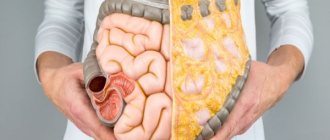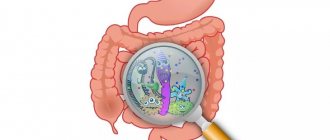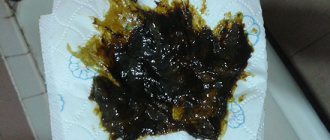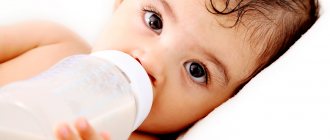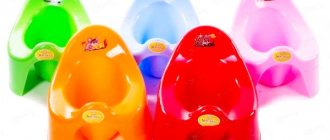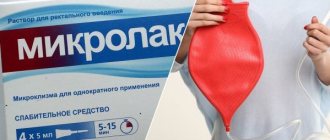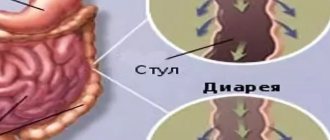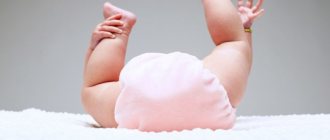A newborn child remains a mystery to its mother for a long time, especially if the child is the first-born. Parents do not yet know what behavior is normal and when to sound the alarm. One of the alarming factors that should attract the attention of parents is diarrhea in a newborn.
It’s just sometimes very difficult to understand whether a baby really has diarrhea or diarrhea. To figure out whether everything is in order, you need, firstly, to know the characteristics of stool in children under one year old, and secondly, to study your child well.
The fact is that different children can differ greatly in their behavior from each other, and at the same time fit into the norm.
Diarrhea in a baby
It would seem that the definition of diarrhea is quite simple - it is frequent loose stools.
In fact, diarrhea in a child under one year old, especially in the first 6 months, cannot be identified immediately. A child’s stool at this age, especially if the baby is breastfed, normally has a very soft, even watery, mushy consistency, which is why some inexperienced parents may begin to sound the alarm. In reality, the frequency and appearance of a child’s stool changes throughout the first year of life, and normal variations may be as follows:
- in the first month of life, the child may have stool after each feeding, that is, up to 8 times a day. At the same time, it is rich yellow in color, may be a little liquid or resemble gruel with a sour milk smell. Do not be alarmed if the newborn’s stool contains whitish lumps or a small amount of mucus: the baby’s stomach and intestines are adjusting - this is quite normal;
- from 2 months, the frequency of stool in the child decreases. The baby can have bowel movements up to 5 times a day, the appearance and smell of stool normally remain the same;
- From the age of 3 months, the baby has stools 1-2 times a day, becomes a little thicker, acquires a uniform consistency and a darker color.
As complementary foods are introduced and the baby becomes familiar with new foods, the baby's stool will continue to change, becoming darker and denser, and acquiring a different smell.
What does diarrhea look like in a baby:
- very frequent watery stools;
- Strong smell;
- color change (greenish, unpleasant brown);
- stool contains foreign inclusions: pus, blood, large amounts of mucus, particles of undigested food;
- redness, irritation, rash on the skin around the baby's anus.
Diarrhea, or diarrhea, is loose stool that occurs more than twice a day. Diarrhea is not a disease, just a sign of some other more serious pathology. Doctors distinguish 6 main types of diarrhea:
- Alimentary diarrhea. The reason for the appearance of this condition is associated with the child’s poor diet, as well as allergic reactions to medications or some foods.
- Infectious diarrhea. The etiology of diarrhea is associated with infectious diseases, for example, dysentery, salmonellosis, toxic infection, etc.
- Toxic diarrhea. Occurs, as a rule, when the body is poisoned with inorganic substances (arsenic, mercury, etc.).
- Dyspeptic diarrhea. The reason for its occurrence is insufficient production of certain enzymes by the baby’s body.
- Drug-induced diarrhea. It is diagnosed in a child after taking certain medications (antibiotics, sulfonamides, nitrofurans) that affect the intestinal flora.
- Non-congenital diarrhea. The cause of its occurrence is the problematic regulation of intestinal motor activity. That is, diarrhea in this case may occur due to fear or severe anxiety.
Only an experienced pediatrician can say for sure what causes diarrhea in a baby.
Baby stool consistency
The consistency of a baby's stool is influenced by many factors, such as:
- Taking any medications;
- Disease;
- Mother's diet;
- Adaptation of the child’s digestive system, etc.
From the moment of birth, the baby's feces are liquid and may contain white impurities, which indicates coagulated protein. Such impurities are an absolute norm, since the baby’s enzyme system is at the development stage and may not fully digest protein until 4 months. You should pay attention to the stool, but if the baby poops loosely, the stool is yellow, the baby is gaining weight well and looks healthy, mothers should not worry.
Normally, the baby's stool remains liquid or mushy until the first complementary foods are introduced. During this period, as a rule, the color, smell, and frequency of bowel movements change, but the consistency remains the same. In the first week, the feces are black and called meconium. They begin to lighten after the mother's colostrum is replaced by milk. The frequency of bowel movements may vary.
It is considered normal for a child to have a bowel movement once every 4-5 days, while the consistency of the stool remains mushy, and the child is calm. You should be wary if a woman is breastfeeding and the baby defecates meconium. In this case, it is recommended to have your breast milk tested to determine its fat content. You should also increase the number of breastfeedings in order to improve the feeding process.
In order for the baby's stool to be of normal consistency, the process of breastfeeding should be established.
What should parents do if their baby has diarrhea?
If diarrhea occurs after introducing a new product into the diet, it must be discontinued immediately. Be sure to continue breastfeeding, this will help the baby compensate for the lack of fluid.
For bottle-fed babies with stool upset, fermented milk, soy or lactose-free formulas are recommended. Feed the child according to his appetite, in no case force-feed or overfeed. Be sure to consult a doctor.
As for medications for diarrhea, they should be given to children under one year of age with extreme caution. The use of fixatives (Furazolidone, Loperamide, Imodium) to treat diarrhea in infants is strictly prohibited.
It would be advisable to take the following remedies for diarrhea in a newborn:
- Linex, Hilak-Forte (help normalize intestinal microflora, can also be used for preventive purposes);
- Filtrum (has an antimicrobial, calming effect, indicated for the treatment of diarrhea in infants);
- Activated carbon is a proven effective absorbent, but it is quite difficult to give it to infants;
- Smecta, Enterosgel (remove allergens from the body, cleanse the body of toxins).
To have something to base the comparison on, let’s look at the characteristics of normal bowel movements. Let's start with consistency and remember what babies eat:
- breast milk;
- nutritional mixtures.
Every mother should clearly know what can cause diarrhea in her baby, and what needs to be done in this situation. After each bowel movement, the mother should wash the baby well. Doctors in this case do not recommend using wet wipes, as they can provoke the development of allergies in the baby. Drug therapy is prescribed to a child only after a diagnosis has been made by a doctor.
If the child is diarrhea without vomiting, then the young mother should try to stop the diarrhea by putting the baby to the breast as often as possible. The fact is that in this way the baby will be able to get both drink and food. Pediatricians allow children to be given Smecta or Enterosgel for diarrhea. The mixture should be given in small portions every 15-20 minutes.
If a breastfed or bottle-fed baby has diarrhea for more than two days, you should consult a doctor. A pediatrician should be called in the following cases:
- the fontanelle has sunk;
- the child has diarrhea and vomiting;
- basal temperature – 38 °C;
- the baby looks lethargic, apathetic, refuses to eat;
- lips are dry, there are no tears when crying;
- There are streaks of blood and mucus in the stool.
If a child has diarrhea and vomiting, then most likely he will need drug treatment, but only a pediatrician should prescribe it. It is believed that the best remedies for diarrhea are the following drugs:
- Enterofuril. Can be given to babies from 1 month (contraindicated in premature babies). This is an excellent antimicrobial drug that quickly copes with diarrhea and other symptoms of intestinal infections.
- Loperamide. It stops diarrhea well, but this medicine can only be used by children from the age of two. Doctors do not recommend using this remedy for colitis and diarrhea with hyperthermia.
- Enterol. Prescribe to children from 1 year. An excellent antimicrobial agent that has an antitoxic effect on the body.
- Phthalazol. It can be given to babies from two months. Has a wide spectrum of action. Used for various intestinal infections, such as dysentery.
- Tannacomp. Can be given to newborns. It is an antidiarrheal agent that has an astringent effect. At the same time, it also has an antispasmodic effect.
- Sulgin. Designed for babies from 6 months. This drug copes well with diarrhea, as well as colitis and dysentery.
- Lactobacterin is a probiotic that can be used even by newborns. This medicine can improve intestinal activity, metabolic processes, and also restore immunity.
- Hilak Forte - the medicine copes well with diarrhea, and also regulates the intestinal microflora.
- Bifiform is an excellent source of B vitamins, as well as probiotic microorganisms.
The child has normal loose stools
Young parents begin to panic even when the baby’s stool becomes more frequent and thinner, not caused by a pathological process, so you need to learn to identify the differences between diarrhea and simply changes in the nature of bowel movements:
- A breastfed baby cannot have thick stools; they resemble liquid yellow porridge. If there are no signs of infection or poisoning, this type of bowel movement is considered normal, even when the baby poops up to 10 times a day.
- Prolonged diarrhea is caused by serious reasons, which will be discussed below, and is accompanied by severe symptoms. Therefore, attentive parents will be able to distinguish pathological diarrhea from frequent bowel movements within normal limits.
- Pathological stool is accompanied by dehydration of the infant; this condition is life-threatening and requires immediate medical intervention - diarrhea must be recognized immediately.
You need to know what diarrhea looks like in a breastfed baby. The color of stool becomes green, the consistency is watery, and the amount increases to 15-20 times a day. These are the symptoms of diarrhea in newborns, which you need to remember in order to promptly go to the hospital.
If children's stool is normal, then its color varies from yellow to brownish-greenish, the consistency is similar to liquid porridge. There may be small specks of white in the stool. When stool becomes more frequent and has a thinner consistency, it is not necessary to immediately suspect diarrhea; sometimes this is considered normal.
A breastfed baby stains diapers with feces with a sour smell, and the feces of an artificial baby smell unpleasant, and the smell changes if you switch to a different type of formula. In infants fed artificial formula, the feces are often greenish in color, which is explained by the presence of iron in the diet - this is not considered a pathology. After six months, when complementary foods are introduced into the diet, the color and consistency of stool changes - it darkens and becomes thicker.
The mother's diet directly affects the baby's stool
Treatment of diarrhea in a breastfed baby depends on the cause of the pathology. If the problem is caused by poor nutrition of the mother, it is necessary to remove provoking foods from the diet. It is better to transfer a newborn who is fed artificial formulas to hypoallergenic and lactose-free formulas. If diarrhea began after introducing a new complementary food into the child’s diet, it is worth stopping the food and returning to the previous diet.
How to treat diarrhea in a breastfeeding baby? You cannot prescribe medications yourself, since adult medications like Imodium or Furazolidone are not suitable for babies under 12 months. It is necessary to give a newborn with diarrhea products from the groups of probiotics and prebiotics to normalize the intestinal flora - Lactulose, Hilak-Forte, Bio-Gaya.
Most mothers pay attention to every fact of their baby’s bowel movements. Often they may be alarmed by the seemingly normal stool of a baby. Experts recommend not to get nervous ahead of time and pay attention to details.
Very loose stool
Since normally a baby's stool should be liquid, if there are no other symptoms, the mother should not worry.
Note! The stool of a bottle-fed baby and a baby fed breast milk is always different. Therefore, if a breastfed baby produces feces in a more liquid state than a bottle-fed baby, this is the norm.
If, with very loose stools, the child remains cheerful, smiling, mobile, with normal body temperature and good weight gain, there is no point in worrying. If the toddler becomes capricious, lethargic, and the body temperature rises, this is a reason to seek advice from a specialist.
Frequent loose stools
Loose, frequent stools in a newborn are also normal in many cases. The only thing you need to pay special attention to is the fact that too frequent bowel movements can lead to dehydration. How frequent should stools be for the mother to be alarmed? If a child has bowel movements more than 8 times per day, and the feces have a very liquid consistency, you should seek help from a pediatrician, who can prescribe tests and, based on the results, determine what causes this frequency of bowel movements.
Important! Pediatricians advise not allowing babies to drink water in the first months of life, based on the fact that mother’s milk contains it. But with frequent and very loose stools, it is still necessary to give water, since the baby’s body loses fluid very quickly, even when slightly overheated, not to mention diarrhea.
In order to avoid dehydration, it is recommended to give the baby clean water.
Loose stools in infants are a common occurrence. You should be wary just in the case when the baby's feces are similar in consistency to the feces of an adult. A child who is exclusively breastfed without additional complementary feeding eats only liquid food, and accordingly, his feces cannot harden.
It’s still worth paying attention to color, smell, consistency, and impurities. This will help prevent many diseases or detect them in the early stages.
In itself, frequent bowel movements are not so scary if we are talking about an adult. This is the natural ridding of the body from infections that have entered it from the outside. For infants, indigestion can be very dangerous due to the fact that the body loses fluid in a very short time.
Liquid feces in a baby without any impurities, with the absence of foam, are a sign of normal functioning of the body. Also, the absence of diseases with loose stools includes the following indicators in aggregate:
- Healthy complexion, rosy cheeks;
- Good weight gain;
- Motor activity;
- Smiling, etc.
Mechanism of development of diarrhea
Intestinal epithelial cells produce special mucus, which includes mucopolysaccharides. They protect the intestinal mucosa from the effects of pathogenic microbes. Infectious agents destroy the structure of epithelial cells, so they become more vulnerable. To restore normal functioning of the gastrointestinal canal, the child’s body begins to produce more fluid, which helps remove toxins from the body.
Important! Only a pediatrician can know all the signs of incipient diarrhea. Only he can, with 100% probability, distinguish diarrhea from the baby’s normal physiological stool.
Symptoms of the disease
First of all, the development of the problem is indicated by yellow, loose stools in a breastfed baby. The baby soils the diapers several times more often than usual, the color of the stool changes to greenish, and the consistency changes to watery. The feces also acquire a pungent odor with notes of rot.
Pathological stool causes bloating, the newborn becomes anxious and screams. At night he often wakes up, and intense rumbling can be heard in his tummy. Liquid stool streaked with blood in a baby should frighten parents, as well as the appearance of a large amount of foam in the stool. Against the background of colic and pain in the gastrointestinal tract, the temperature often rises, which is also an alarming symptom.
Attention! Such a picture should not leave parents indifferent; the baby’s body is prone to rapid dehydration. In order not to provoke dangerous complications, you need to monitor the baby’s well-being and take measures to eliminate loose, mucous stools.
Dehydration: signs and treatment
The most severe consequence of diarrhea in an infant is dehydration. With the loss of fluid in the body, metabolism is disrupted, immunity drops sharply, since the volume of useful electrolytes (salts) decreases. The following symptoms are alarming:
- extremely rare urination (the urine is dark and concentrated) or its absence;
- sudden weight loss;
- dry lips and tongue, lack of tears;
- dryness and inelasticity of the skin;
- pallor, dark circles under the eyes;
- retraction of the anterior fontanelle;
- lethargy, apathy, inactivity.
Diarrhea in a newborn - photo
Dehydration is an extremely dangerous condition for the body that requires immediate treatment. The main task in the treatment of dehydration is to replenish lost fluid and normalize water-salt metabolism in the child’s body. For this it is recommended:
- Be sure to take special saline solutions (Regidron, Gastrolit, Oralit), which normalize the exchange of electrolytes in the body. Ready-made solutions are sold in pharmacies and have no age restrictions for use.
- Give the child saline solutions after each bowel movement; the volume of a single dose of the solution is calculated by the doctor. The solution must be taken slowly, in small sips; for infants, it can be dripped through a pipette.
- Drink plenty of fluids. For dehydration, ordinary boiled water, highly diluted juice, rice water, blueberry compote, and special children's teas are suitable. They should be given in the intervals between doses of solutions.
- Breastfed babies should be put to the breast as often as possible, provided that diarrhea is not caused by overfeeding.
It is necessary to take all possible measures to restore the baby’s water supply in the body, since prolonged dehydration can lead to extremely serious consequences.
Now let’s look at diarrhea in an infant; the photos clearly demonstrate the differences between normal and abnormal stools:
- In addition to the fact that bowel movements become more frequent, the consistency changes - with diarrhea, the discharge is watery, the child can literally “shoot” a stream.
- The color takes on a distinct greenish tint, and in addition to mucus, bloody inclusions may be observed.
- The smell changes, becoming very sharp and sour.
- In cases of artificial diarrhea, stool appears shiny, may become foamy, pain in the abdomen often occurs, and the number of stools increases noticeably.
- If the child is more than a year old, then the disorder is considered to be a condition in which bowel movements occur more often than three times in 24 hours.
In addition to determining what diarrhea looks like in an infant, it is necessary to take into account accompanying factors - the presence of vomiting, high fever, pain, gas formation, change in odor. The following phenomena should cause concern and immediately contact a pediatrician:
- In a short period of time, the child defecated three to five times.
- The stool is excessively liquid, contains foam, mucus, bloody streaks or clots.
- The baby's temperature rose to 380C.
- Frequent excretion of feces is accompanied by vomiting.
- The child experiences drowsiness, becomes lethargic, lips dry out, and eyes droop.
- Diarrhea is accompanied by a large amount of gases released.
- Flaky areas appear on the skin, especially in the abdomen, cheeks, elbows, and lower extremities.
What are the dangers of chronic or acute diarrhea?
Diarrhea is a dangerous phenomenon for the baby’s body. In acute and chronic diarrhea, the following consequences may occur:
- intoxication;
- dehydration;
- violation of water-salt balance in the body;
- convulsions;
- cachexia (exhaustion);
- disruption of the cardiovascular system;
- muscle pain;
- development of dysbacteriosis;
- dysfunction of the neuroendocrine system;
- hypovitaminosis;
- rectal prolapse;
- decreased immune resistance of the body;
- cracks in the rectum.
Features of the intestinal structure
Dehydration is an extremely dangerous condition for a baby. To eliminate the effects of dehydration, doctors prescribe a number of medications:
- Hydrovit;
- Humana Electrolyte;
- Gastrolit;
- Oralit.
The dosage of solutions is calculated based on 100 ml per 1 kg of child’s body weight. You need to drink after each act of loose bowel movement or vomiting. Doctors do not recommend using Regidron for children under one year of age, since the concentration of active substances in it is high for infancy. If you have nothing on hand other than Regidron, before use you need to dilute it in double the volume of water.
Children over 6 months old can be given dried fruit compote. If necessary, the child should be fed by force, from a pipette or from a syringe without a needle. Dehydration may worsen, then its consequences will be eliminated in the hospital through glucose drips, which is much more painful for both the child and the parents.
Practitioners believe that children under one year of age do not have stable immunity, so the appearance of diarrhea is influenced by a variety of factors. The condition of feces is affected by any changes: bronchitis, otitis media, nervous shock, overheating, hypothermia. Before treating any disease, you need to understand why it arose, that is, determine its etiology. Only a qualified specialist can determine the exact cause of diarrhea. Without a diagnosis, it is impossible to cure a child.
What should parents do if their newborn has diarrhea?
As a rule, diarrhea is acute, occurs suddenly and goes away within 1–2 days. However, if the following symptoms of diarrhea appear in an infant, you should absolutely not wait until it “goes away on its own” and you should consult a doctor immediately:
- lethargy, apathy, drowsiness;
- stomach ache;
- sudden weight loss;
- increased or decreased temperature;
- nausea, vomiting, severe regurgitation.
Diarrhea in a baby - photo
When changing a diaper, you need to pay attention to its contents. The nature of the stool can tell a lot about the health of the baby. Symptoms of diarrhea in infants can be different:
- Foam and blood in the stool are a key sign of the development of infection in the body. Additional symptoms in this case include redness of the skin, abdominal pain, fever and vomiting.
- Frequent bowel movements with white spots and undigested pieces of food may indicate that the child is overeating.
- Diarrhea of changed color and structure that occurs after feeding may be a reaction to complementary foods.
- Diarrhea with foam and mucus impurities indicate the presence of an allergic component. Skin rashes may appear.
- Defecation of contents with foam occurs when infected with staphylococcal enterocolitis.
- Feces of altered consistency, but without pathological impurities, indicate teething. An increase in body temperature up to 38 ° C, hypersalivation and swelling of the gums are possible.
- Liquid stool, in which mucus, foam and streaks of blood are detected, may indicate the development of dysbiosis, which is caused by antibiotic therapy.
Clinical examination of the child
In the first days of life after the birth of a child, meconium (original feces) comes out of the intestines. This substance has a viscous consistency. If meconium still continues to pass on the 3rd day, you need to tell your pediatrician about this, as this may be a sign of intestinal atresia - improper development of one or more sections of the intestinal tube. Against the background of this pathology, intestinal obstruction develops.
Under normal conditions, stool has a mushy, yellow consistency. In the early stages of postembionary development, the immature digestive system does not always fully cope with its functions, so there may be small curdled inclusions and clots of transparent mucus in the feces.
Another indicator of the normal functioning of the digestive system is the frequency of bowel movements. During breastfeeding, a baby may poop after each feeding and even sometimes during the feeding. This is absolutely normal and is due to two factors: firstly, the newborn’s intestines are not yet fully formed, and secondly, the sucking process itself is slightly relaxing.
Artificial complementary feeding inevitably affects the structure of feces. The stool becomes darker and may contain brownish or greenish inclusions. This is due to the fact that iron is often added to the formula, this helps to avoid anemia in newborns.
The following symptoms will help identify diarrhea in your baby:
- deterioration or lack of appetite;
- increased frequency of bowel movements;
- the appearance of impurities of blood, mucus, foam and water in the stool;
- increased gas formation;
- colic;
- the appearance of a putrid smell of feces;
- weight loss;
- temperature increase.
Constipative diarrhea is characterized by loose stools with mucus
How to distinguish loose stools from diarrhea
How to recognize signs of diarrhea in a breastfeeding baby? You need to be able to distinguish loose stools from pathological ones in order to contact a doctor as soon as possible if alarming symptoms appear:
- loose stool in a newborn is accompanied by a sharp unpleasant odor - it foams, contains pieces of undigested food, admixtures of blood, pus or mucous inclusions;
- the consistency of the stool has become not like gruel, but like completely watery contents of a transparent green color;
- an increase in the number of bowel movements from normal several times (up to 15-25 times a day);
- redness of the skin in the rectal area, confirming the presence of caustic, irritating stool;
- diarrhea is accompanied by fever and vomiting - signs of food poisoning and an infectious process in the intestines;
- the baby often cries and gets nervous, sleeps poorly, or becomes unexpectedly sleepy, and may not eat for 5-6 hours in a row;
- pale skin with signs of cyanosis (local blue discoloration);
- regurgitation or severe vomiting against the background of a sharp loss of body weight.
Diarrhea in a newborn baby during breastfeeding is easier to recognize - the stool changes color and smell, becomes greenish and smells unpleasant. With accompanying bloating, there is a stench.
And the signs of diarrhea in a newborn with artificial feeding are more focused on the baby’s behavior, since the color and smell of the stool in an artificially fed baby are already different - the feces are colored darker (brown-greenish) and usually smell unpleasant. You can understand that a child has diarrhea by signs of abdominal pain - the baby arches and cries during bowel movements.
The baby's poor health and high temperature may be signs of diarrhea.
A newborn's stool may not be thick initially because his diet does not contain solid foods to form elastic fecal masses. Mother's milk makes the baby's stool mushy and yellow; such stool should not cause panic in parents. A baby’s body is different from an adult’s, and the liquefaction of stool can be considered a reaction to various circumstances - from temperature conditions and fright to neurological reactions.
If diarrhea occurs in a baby during mixed feeding, when solid food is introduced into the baby's diet, the symptoms of the pathology become more noticeable. The sudden appearance of loose stools indicates health problems, especially with an accompanying increase in temperature and abdominal pain.
Diarrhea is not a rare occurrence in infants, since their digestive system is not yet fully formed. She is not able to digest some of the components that enter mother's milk. As a result, allergic reactions may appear in the form of a rash or changes in color or smell, as well as the frequency of bowel movements. Another cause of acute diarrhea can be an infection.
Because newborns defecate up to 8 times a day, and one of the signs of diarrhea is the number of stools, many new mothers worry that their baby is sick. This is not true and is included in the norm.
Neonatal diarrhea has several signs by which it can be identified:
- Watery, grey-green stool. A sign of indigestion is this indicator in combination with bloating or cramping. If a baby's gray-green stool is up to 3 months old and there are no other symptoms, it can also be considered normal.
- The frequency of bowel movements cannot change dramatically. That is, if a baby constantly soiled diapers about 5 times a day and suddenly began to do this 2 times more often and more, therefore, his digestive system reacted negatively to something. It could be a new product eaten by the mother, or a virus or bacteria.
- In combination with frequent bowel movements, physical weakness or severe anxiety has appeared, this is a reason to consult a pediatrician.
- You should also consult a doctor if blood or mucus is noticed in the stool, or if the consistency of the stool has become foamy. The content of foam can indicate not only diarrhea, but also malnutrition. As a rule, such impurities are present in the feces when the baby does not receive hind milk, which contains more fat. Therefore, if foam impurities are present in the first 2 months after birth, the mother should establish breastfeeding.
- Impurities in the feces of flakes that are dark green or orange in color are an indicator of the presence of infection in the body.
- If loose stool in a breastfed baby is accompanied by an elevated body temperature, it is also considered an intestinal disorder. This symptom is often observed during teething.
If, in combination with loose stools, the baby shows severe anxiety, this is a reason to consult a doctor.
Causes of diarrhea in a baby
Diarrhea in a newborn can occur for various reasons. This condition is not always associated with infection. Most often, diarrhea in infants is provoked by physiological changes in their body.
If the baby begins to defecate with watery stools without accompanying symptoms, then you need to think about the etiology of this condition. There are many reasons that cause diarrhea. The main ones will be presented below.
The child does not need to be overfed, as this can provoke the development of many undesirable phenomena.
Infants may experience intolerance to certain foods or their components, resulting in intestinal disorders in the form of diarrhea. This intolerance concerns the nutrition of a nursing mother. Very often there is an intolerance to cow's milk proteins, as well as gluten, a protein that is part of cereals.
For your information. This condition, as a rule, does not require any special therapy. When you exclude the product from the diet, all manifestations go away. But determining which particular product causes intestinal dysfunction is very difficult.
Frequently changing breasts during feeding leads to the fact that the baby sucks only the front milk, without reaching the hind milk. In the absence of hindmilk, foremilk cannot be digested normally, since hindmilk contains lactulose, a special enzyme for digesting milk sugar.
Infection
The etiology of diarrhea is often associated with an infectious component. In such cases, diarrhea usually begins abruptly, accompanied by pronounced abdominal pain, fever, and vomiting, usually multiple times. Green diarrhea may appear in a newborn with streaks of blood, as well as mucus and foam. In this case, it is better to hospitalize the child.
Infectious diseases of newborn children have a particularly severe course. Any delay or provision of assistance in an insufficiently professional manner is fraught with fatal consequences or, at the very least, ending up in intensive care. There are a lot of bacterial and viral infections that affect children's intestines. One of the most common is rotavirus infection.
It is very difficult to determine the mixed type of diarrhea
Often, after antibiotic therapy, the baby develops diarrhea. Antibacterial drugs do not have quantitative and qualitative selectivity of action. They destroy not only pathogenic, but also beneficial microorganisms. As a result, dysbiosis occurs. To restore normal intestinal function, doctors prescribe pro- and prebiotics: Bifidumbacterin, Linex, Acipol.
Frequent bowel movements may be a symptom of appendicitis. In children not only of the newborn period, inflammation of appendicitis is accompanied by symptoms from the gastrointestinal tract.
A child’s body is a very fragile and not fully balanced system. Therefore, any unpleasant external factor can cause a negative reaction, one of the manifestations of which will be diarrhea. The causes of stool disorder in infants may be as follows.
Intestinal dysbiosis most often causes diarrhea in a 1-month-old child. The functioning of the gastrointestinal tract is being adjusted, intestinal flora is being formed, the slightest disruption in this process causes digestive disorders and diarrhea in a month-old baby.
Overfeeding your baby can also cause diarrhea. Due to excessive and too frequent feeding, the baby's stomach and intestines are forced to work faster and often fail to cope, in some cases simply removing undigested food.
The introduction of complementary foods is often accompanied by bowel problems in a child at 4 months. Therefore, when adding new foods to a baby’s diet, his well-being and digestion must be carefully monitored.
Diarrhea in a 6-month-old child often occurs as a reaction to teething. Diarrhea during teething in a baby is not considered too dangerous, however, if signs of dehydration appear, you should consult a doctor.
Intestinal infections, helminths, and food poisoning often cause diarrhea in a child at 8–9 months. When children begin to sit and crawl, they begin to actively explore their environment: they grab various objects, pull them into their mouths, and taste everything they see. It can be difficult to keep track of the cleanliness of your baby’s hands, hence various intestinal problems.
An infant may develop diarrhea due to a cold or inflammatory disease (otitis media, ARVI, pneumonia, rhinitis). Diarrhea can also appear during the treatment of these diseases when taking antibiotics.
Loose stool in a baby may be a symptom of an allergic reaction. In this case, irritation and rash around the anus are most often observed.
Diarrhea is one of the signs of a lack of any enzymes. In infants, it most often indicates lactase deficiency (the inability of the intestines to break down milk sugar), but it can be a sign of celiac disease (intolerance to cereal proteins) or a more serious disease - cystic fibrosis.
Infants are very sensitive to their environment, so diarrhea as a reaction to stress or climate change is also a common phenomenon.
Close observation of the baby, analysis of his diet and activity in the days preceding stool loosening can help determine the cause of the disease. However, a final diagnosis can only be made by consulting a doctor.
Signs of illness
A child needs urgent examination by a doctor or emergency hospitalization if he has the following signs:
- Lethargy;
- Drowsiness;
- Loose stools more than 8 times a day;
- Refusal to eat:
- No urination for 5 hours straight;
- Lack of tears when crying;
- Change in skin color around the eyes;
- Dry lips and oral mucosa, etc.
If parents notice one of the above signs in their child, they should not hesitate, they should immediately call an ambulance. To alleviate the child's condition before the doctor arrives, he should be given as much water as possible. Feeding against will is not recommended. If a child has acute diarrhea, then the woman who is breastfeeding is advised to exclude all fatty, spicy and sweet foods from the diet.
The drug "Regidron"
If you have the drug “Regidron” at home, you can use it to replenish your baby’s salt balance. In the absence of oral rehydration drugs, the solution can be prepared independently by adding 1 liter. water, a teaspoon of soda and salt. Taking this solution should be alternated with drinking regular purified water. It is recommended to ensure that water does not remain in the body. To do this, in most cases, the diaper is weighed every 3 hours.
Video on the topic
We invite you to spend a little time watching a video about diarrhea in a child - when to start worrying, what to do and how to treat this problem.
https://youtu.be/JDR4IJtgfss
Any health problems in a little baby can seriously worry parents. And it is better to be prepared for such situations in order to act quickly and competently and provide the necessary assistance to the sick baby. Tell us in the comments if you have experienced diarrhea in your baby? What was the reason and what helped? Your experience will be very useful for other parents.

